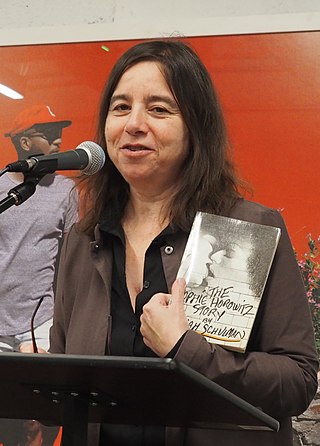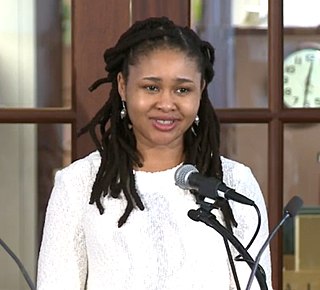
Nalo Hopkinson is a Jamaican-born Canadian speculative fiction writer and editor. Her novels – Brown Girl in the Ring (1998), Midnight Robber (2000), The Salt Roads (2003), The New Moon's Arms (2007) – and short stories such as those in her collection Skin Folk (2001) often draw on Caribbean history and language, and its traditions of oral and written storytelling.

Susan Choi is an American novelist.

Sarah Miriam Schulman is an American novelist, playwright, nonfiction writer, screenwriter, gay activist, and AIDS historian. She holds an endowed chair in nonfiction at Northwestern University and is a fellow of the New York Institute for the Humanities. She is a recipient of the Bill Whitehead Award and the Lambda Literary Award.

Edmund Valentine White III is an American novelist, memoirist, playwright, biographer and an essayist on literary and social topics. Since 1999 he has been a professor at Princeton University. France made him Chevalier de l'Ordre des Arts et des Lettres in 1993.

Ursula Vernon is an American freelance writer, artist and illustrator. She has won numerous awards for her work in various mediums, including the Hugo Award for her graphic novel Digger, the Nebula Award for her short story "Jackalope Wives", and Mythopoeic Awards for adult and children's literature. Vernon's books for children include Hamster Princess and Dragonbreath. Under the name T. Kingfisher, she is also the author of books for older audiences. She writes short fiction under both names.

Michelle Tea is an American author, poet, and literary arts organizer whose autobiographical works explore queer culture, feminism, race, class, sex work, and other topics. She is originally from Chelsea, Massachusetts and has identified with the San Francisco, California literary and arts community for many years. She currently lives in Los Angeles. Her books, mostly memoirs, are known for their exposition of the queercore community.
Abha Dawesar is an Indian-born novelist writing in English. Her novels include Babyji, Family Values, That Summer in Paris, and Miniplanner. Her 2005 novel Babyji won the Lambda Literary Award for Lesbian Fiction and the Stonewall Book Award.
Stacey D'Erasmo is an American author and literary critic.

Charlie Jane Anders is an American writer and commentator. She has written several novels as well as shorter fiction, published magazines and websites, and hosted podcasts. In 2005, she received the Lambda Literary Award for work in the transgender category, and in 2009, the Emperor Norton Award. Her 2011 novelette Six Months, Three Days won the 2012 Hugo and was a finalist for the Nebula and Theodore Sturgeon Awards. Her 2016 novel All the Birds in the Sky was listed No. 5 on Time magazine's "Top 10 Novels" of 2016, won the 2017 Nebula Award for Best Novel, the 2017 Crawford Award, and the 2017 Locus Award for Best Fantasy Novel; it was also a finalist for the 2017 Hugo Award for Best Novel.

Anna Livia was a lesbian feminist author and linguist, well known for her fiction and non-fiction regarding sexuality. From 1999 until shortly before the time of her death she was a member of staff at University of California, Berkeley.

Terry Wolverton is an American novelist, memoirist, poet, and editor. Her book Insurgent Muse: Life and Art at the Woman's Building, a memoir published in 2002 by City Lights Books, was named one of the "Best Books of 2002" by the Los Angeles Times, and was the winner of the 2003 Publishing Triangle Judy Grahn Award, and a finalist for the Lambda Literary Award. Her novel-in-poems Embers was a finalist for the PEN USA Litfest Poetry Award and the Lambda Literary Award.
Robert Triptow is an American writer and artist. He is known primarily for creating gay- and bisexual-themed comics and for editing Gay Comix in the 1980s, and he was identified by underground comix pioneer Lee Marrs as "the last of the underground cartoonists."

Samuel R. "Chip" Delany is an American writer and literary critic. His work includes fiction, memoir, criticism, and essays on science fiction, literature, sexuality, and society. His fiction includes Babel-17, The Einstein Intersection ; Nova, Dhalgren, the Return to Nevèrÿon series, and Through the Valley of the Nest of Spiders. His nonfiction includes Times Square Red, Times Square Blue, About Writing, and eight books of essays. He has won four Nebula awards and two Hugo Awards, and he was inducted into the Science Fiction and Fantasy Hall of Fame in 2002.

Mattilda Bernstein Sycamore is an American author and activist. She is the author of two memoirs and three novels, and the editor of six nonfiction anthologies.

Nora Keita Jemisin is an American science fiction and fantasy writer. Her fiction includes a wide range of themes, notably cultural conflict and oppression. Her debut novel, The Hundred Thousand Kingdoms, and the subsequent books in her Inheritance Trilogy received critical acclaim. She has won several awards for her work, including the Locus Award. The three books of her Broken Earth series made her the first author to win the Hugo Award for Best Novel in three consecutive years, as well as the first to win for all three novels in a trilogy. She won a fourth Hugo Award, for Best Novelette, in 2020 for Emergency Skin. Jemisin was a recipient of the MacArthur Fellows Program Genius Grant in 2020.
Roberta Leah Jacobs Gellis was an American writer of historical fiction, historical romance, and fantasy. She held master's degrees in both biochemistry and medieval literature.
Persimmon Blackbridge is a Canadian writer and artist whose work focuses on feminist, lesbian, disability and mental health issues. She identifies herself as a lesbian, a person with a disability and a feminist. Her work explores these intersections through her sculptures, writing, curation and performance. The novels she has written follow characters that are very similar to Blackbridge's own life experiences, allowing her to write honestly about her perspective. Blackbridge's struggle with her mental health has become a large part of her practice, and she uses her experience with mental health institutions to address her perspective on them. Blackbridge is involved in the film, SHAMELESS: The Art of Disability exploring the complexity of living with a disability. Her contributions to projects like this help destigmatize the attitudes towards people with disabilities. Blackbridge has won many awards for her work exploring her identity and the complexities that come with it.

Chinelo Okparanta(listen) is a Nigerian-American novelist and short-story writer. She was born in Port Harcourt, Nigeria, where she was raised until the age of 10, when she emigrated to the United States with her family.
Imogen Binnie is an American transgender novelist who made her debut with the publication of Nevada in 2013.
Queer art, also known as LGBT+ art or queer aesthetics, broadly refers to modern and contemporary visual art practices that draw on lesbian, gay, bisexual, transgender, and various non-heterosexual, non-cisgender imagery and issues. While by definition there can be no singular "queer art", contemporary artists who identify their practices as queer often call upon "utopian and dystopian alternatives to the ordinary, adopt outlaw stances, embrace criminality and opacity, and forge unprecedented kinships and relationships." Queer art is also occasionally very much about sex and the embracing of unauthorised desires.













